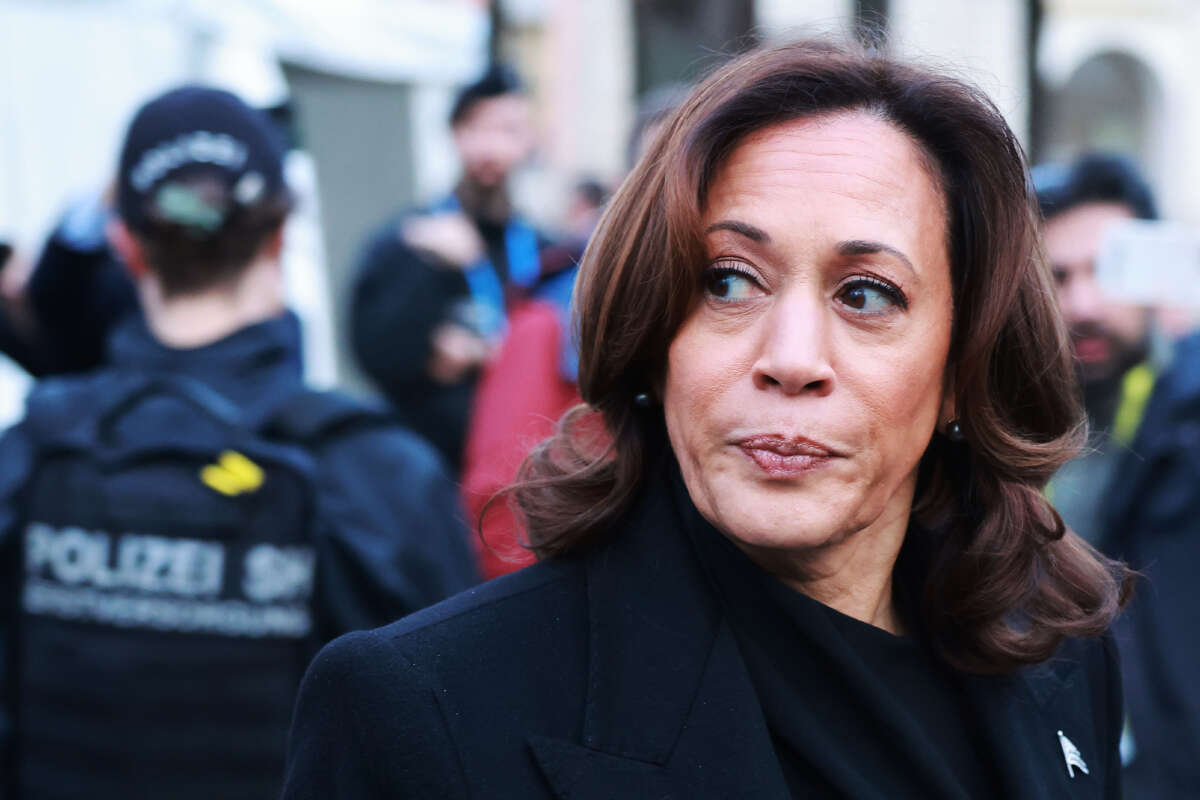Honest, paywall-free news is rare. Please support our boldly independent journalism with a donation of any size.
In a campaign stop on Sunday, Vice President Kamala Harris called for a six-week pause — which she called a “ceasefire” — in Israel’s attacks in Gaza, co-opting the phrasing that pro-Palestine advocates have been using for months to instead promote what advocates say would simply amount to a “pause to the genocide.”
In a speech in front of the historic Edmund Pettus Bridge in Selma, Alabama, Harris paused after calling for “an immediate ceasefire,” allowing the crowd to cheer before continuing on, “for at least the next six weeks, which is what is currently on the table.” She blamed Palestinian leaders for not wanting the deal, though reports say that the negotiations are still ongoing, with Hamas forces unwilling to release all Israeli hostages until Israel agrees to withdraw its troops altogether and release some of the thousands of Palestinian hostages it has taken in recent months.
Harris’s refusal to call for a permanent ceasefire comes as Israel’s genocidal military campaign in Gaza has killed more than 30,000 Palestinians and injured 70,000, with thousands of people still missing under the rubble.
Many news outlets — including ones with a demonstrated pro-Israel bias — simply reported that Harris called for a ceasefire in headlines and social media posts, with The Washington Post going as far as to call Harris’s words a “tonal shift.” However, without the context of it being a temporary ceasefire, or something that other officials have called a “humanitarian pause,” the headlines make it seem as though Harris made a stronger call than she really did, advocates have pointed out.
“Vice President Kamala Harris is rebranding Biden’s previous call for a six week humanitarian pause as a ‘ceasefire,’” Democratic strategist and former Justice Democrats spokesperson Waleed Shahid wrote on social media on Monday. “This is largely a messaging shift without a policy change as Biden continues to fund [Israeli Prime Minister Benjamin] Netanyahu with billions in weapons aid.”
Indeed, Biden last month said that he was working on a deal for a six-week “period of calm” and said last week that he was hoping for a pause to begin on Monday — which, as of Monday evening Gaza time, has not yet happened.
Other advocates for Palestinian rights have pointed out that Harris and Biden’s calls for a temporary ceasefire in recent weeks come as the administration is scrambling to contain the growing campaign to choose “uncommitted” over Joe Biden in states’ Democratic primaries.
The campaign, launched by anti-Zionist advocates in Michigan last month, had a powerful showing in last week’s Michigan primary, with over 101,000 voters choosing “uncommitted” — enough votes to earn two delegates to the Democratic National Convention in Chicago in August. Since then, the campaign has spread to states across the country, with voters mobilizing to send a strong rebuke to Biden over his unwavering support of Israel.
“Vice President Harris calling for a six week temporary ceasefire is a very specific amount of time. In fact, it’s just enough time to get most of the Democratic Primaries out of the way. After April 15 there are only a handful of primaries left, with the largest being Pennsylvania on April 23,” said Abed A. Ayoub, national executive director of Arab-American Anti-Discrimination Committee, the U.S.’s largest Arab American civil rights group.
Harris’s call for a pause also came just two days before Super Tuesday, when 15 states and American Samoa are holding primary votes, including crucial swing state North Carolina.
“What she asked for isn’t a ceasefire, it’s a pause to the genocide,” Ayoub continued.
Thank you for reading Truthout. Before you go…
…We ask that you take just a second to read this message.
We are up against a far-reaching, wide-scale attack on press freedom coming from the Trump administration. Since his inauguration last year, we’ve seen frightening censorship, a right-wing takeover of the news industry, and worsening financial conditions for progressive nonprofits across the board.
We can only resist Trump’s agenda by cultivating a strong base of support. The right-wing mediasphere is funded comfortably by billionaire owners and venture capitalist philanthropists. At Truthout, we have you.
We need your help to sustain the fight against authoritarianism in 2026. Please take a meaningful action in this fight: make a one-time or monthly donation to Truthout. If you have the means, please dig deep.
